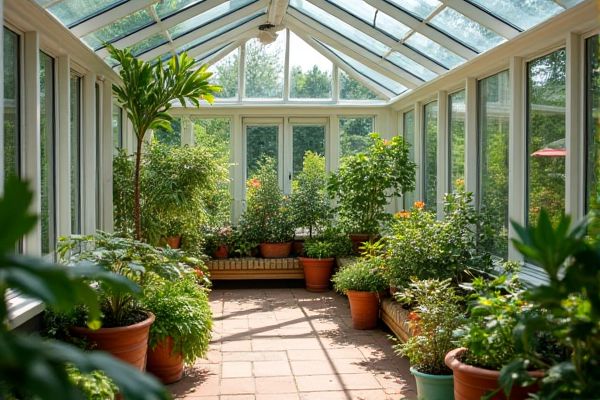
Built-in planters offer a permanent, custom design that integrates seamlessly into your sunroom's architecture, providing stability and a polished look, whereas container gardens provide flexibility and mobility, allowing you to rearrange or move plants as needed to optimize sunlight and space. Explore the rest of the article to discover which option best suits your gardening style and enhances your sunroom greenery.
Table of Comparison
| Feature | Built-in Planters | Container Garden (Sunroom) |
|---|---|---|
| Installation | Permanent, integrated into structure | Portable containers, flexible setup |
| Space Usage | Saves floor space, fixed location | Requires floor or shelf space, movable |
| Maintenance | Limited access, requires planning for drainage | Easy access, simple drainage management |
| Design Flexibility | Custom shapes, integrated aesthetics | Varied container types and arrangements |
| Cost | Higher upfront cost for installation | Lower initial cost, scalable over time |
| Mobility | Fixed, cannot be moved | Highly portable, easy to rearrange |
| Sunlight Exposure Control | Dependent on fixed location | Adjustable placement for optimal light |
| Plant Variety | Best for shallow-rooted or small plants | Supports diverse plant types and sizes |
Introduction to Sunroom Gardening
Sunroom gardening offers a versatile space for cultivating plants year-round, with options like built-in planters and container gardens enhancing plant growth in controlled environments. Built-in planters provide permanent, integrated spots optimized for specific plant types, while container gardens offer flexibility to rearrange and customize the growing area based on light exposure and seasonal changes. Choosing between these options depends on space, aesthetic preferences, and the types of plants suited for indoor sunroom conditions.
What Are Built-in Planters?
Built-in planters are fixed gardening structures integrated into your sunroom's design, offering a permanent and stable environment for plants. Unlike container gardens that use movable pots, built-in planters are often constructed from durable materials like wood, stone, or concrete, enhancing aesthetic appeal and maximizing space efficiency. These planters provide improved insulation and drainage, promoting healthier plant growth by maintaining consistent soil conditions within your sunroom.
Understanding Container Gardens
Understanding container gardens in sunrooms involves recognizing their flexibility and mobility compared to built-in planters. Container gardens allow for easy rearrangement, seasonal plant changes, and better control of soil conditions, making them ideal for maximizing sunlight exposure. They also offer versatility in design and plant variety, supporting diverse microclimates within the sunroom environment.
Design Flexibility and Aesthetics
Built-in planters offer seamless integration with sunroom architecture, enhancing aesthetic cohesion and providing sturdy, permanent planting solutions that complement interior design themes. Container gardens in sunrooms allow greater design flexibility, enabling easy rearrangement, seasonal plant changes, and diverse styles with varying pot materials, shapes, and sizes. Both options contribute distinct visual appeal; built-in planters create a polished, unified look, while container gardens introduce dynamic, adaptable greenery that can evolve with personal taste.
Space Utilization in Sunrooms
Built-in planters maximize space utilization in sunrooms by integrating directly into walls or window sills, creating a cohesive and streamlined growing area without occupying floor space. Container gardens offer flexibility for rearranging and customizing plant placement but can consume valuable floor or shelf space, potentially limiting movement and other uses of the sunroom. Efficient space management in sunrooms favors built-in planters for permanent, space-saving solutions, while container gardens suit versatile, adaptable plant arrangements.
Plant Health and Root Management
Built-in planters in a sunroom offer superior root management by providing consistent soil depth and improved drainage, which promotes healthier plant growth compared to container gardens. Container gardens often require frequent monitoring for moisture levels to prevent root rot or dehydration, potentially stressing your plants. Choosing built-in planters helps maintain stable soil conditions, enhancing plant health and reducing maintenance needs in your sunroom environment.
Watering and Drainage Solutions
Built-in planters in sunrooms offer integrated watering systems with direct drainage channels that prevent waterlogging and reduce maintenance efforts. Container gardens require careful selection of pots with adequate drainage holes and saucers to manage excess water and avoid root rot. Efficient watering solutions in both setups rely on proper irrigation techniques and regular monitoring to ensure optimal plant health and soil moisture balance.
Maintenance and Upkeep Requirements
Built-in planters in a sunroom require regular inspection for structural integrity and drainage to prevent water damage and mold, while container gardens demand frequent watering, repotting, and pest management to maintain plant health. Your choice influences the time and effort needed for maintenance: built-in planters offer a more stable environment with less frequent soil replacement but can be challenging to clean, whereas container gardens provide flexibility with easier access for upkeep but may dry out faster. Understanding these differences helps optimize plant care strategies suited to your lifestyle and sunroom design.
Cost Comparison: Built-in vs. Container
Built-in planters in a sunroom typically involve higher upfront costs due to construction, materials, and labor, while container gardens offer a more budget-friendly alternative with flexible pricing based on pot size and plant types. Maintenance and modification expenses tend to be lower for container gardens since you can easily rearrange or replace plants without structural changes. Your choice will impact long-term investment and upkeep, with built-in planters adding value but container gardens providing cost-effective versatility.
Which Option Is Right for Your Sunroom?
Built-in planters provide a permanent, integrated solution for a sunroom, offering stability, custom design, and space optimization ideal for larger plants or a structured garden layout. Container gardens allow flexibility, mobility, and seasonal variety, making them suitable for renters or those who prefer to frequently rearrange and experiment with plant species. Assess your sunroom's size, light exposure, and personal gardening goals to determine whether built-in planters or containers will best support your desired indoor gardening experience.
 homyna.com
homyna.com